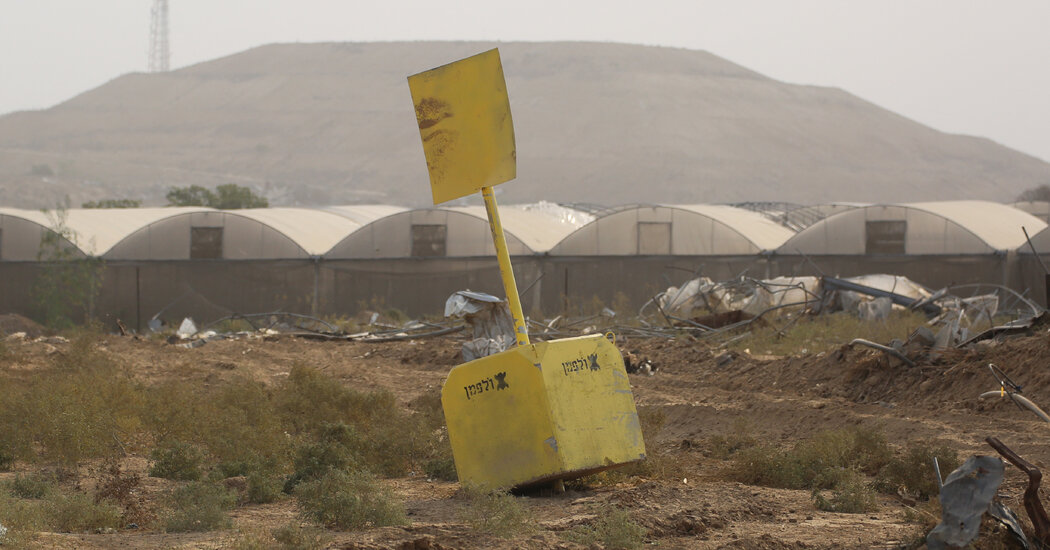Scores of Palestinian militants are still in Israeli-controlled parts of Gaza and blocked from leaving safely by the military, three Israeli security officials have said, posing a challenge to mediators hoping to shore up a fragile truce between Israel and Hamas.
The militants’ proximity to Israeli soldiers has raised concerns about inadvertent clashes. Israel redeployed its forces inside Gaza as part of the cease-fire deal in October, leaving the military in control of roughly half of the enclave.
Some of those militants are believed to be hiding in tunnels under the southern city of Rafah, said the officials, who spoke on condition of anonymity to discuss sensitive details. It is unclear how long the militants have been in those areas.
A person close to Hamas’s leadership confirmed the presence of the militants behind the Israeli withdrawal boundary, known as the “yellow line.” Hamas officials declined to comment.
Since the start of the truce, the Israeli military has said that it was targeted twice by militants in Rafah, killing three soldiers. It said those attacks had been staged behind the yellow line.
The military held Hamas responsible for those attacks and responded by carrying out enormous strikes across Gaza. Around 150 Palestinians were killed in those strikes, including children, according to Gaza’s health authorities, who do not distinguish between combatants and civilians.
Hamas’s armed wing said that it had no connection to the attacks in Rafah and that it was sticking to the cease-fire. The group claimed to have lost touch with its fighters there in recent months.
The person close to Hamas’s leadership, who spoke on condition of anonymity to freely discuss the group’s position, said the two sides had been close to a deal to allow for the safe passage of the militants.
Bezalel Smotrich, a far-right minister in the Israeli government, confirmed officials had been discussing an arrangement to allow the militants to leave. In a news conference on Monday, he said he strongly opposed the move, which would have been “a betrayal” of Israeli soldiers.
“I was happy to hear that the prime minister rejected this absurd idea, and I hope he sticks to that,” Mr. Smotrich said.
The office of Prime Minister Benjamin Netanyahu of Israel did not respond to a request for comment.
The Trump administration and mediating countries in the region say they are working to turn the cease-fire between Israel and Hamas into a lasting peace. The two warring sides agreed to an initial truce in mid-October, which saw all of the 20 surviving hostages in Gaza freed in exchange for the release of nearly 2,000 Palestinian prisoners and detainees.
Every week has brought new tests for the cease-fire amid flare-ups of violence between the two sides.
Tensions have arisen over the return of hostages’ remains still in Gaza. Israel has accused Hamas of delaying the handover, which Hamas was obligated to do as part of the agreement.
Hamas officials have claimed that some bodies were lost under rubble or that they could not be located because the militants who buried them earlier in the war had since been killed.
Late Wednesday night, Hamas handed over the body of Joshua Loitu Mollel, according to the Israeli prime minister’s office.
It said Mr. Mollel, an agriculture student from Tanzania, was abducted during the Hamas-led assault on Oct. 7, 2023, which ignited the war in Gaza. The bodies of at least six captives are still in Gaza, according to the Israeli authorities.
Since the cease-fire came into effect, Israeli forces have attacked Gazans it said had crossed their withdrawal lines in violation of the agreement, including a civilian vehicle, carrying several members of an extended family.
At least nine people were killed, including several children, according to family members, while two others were presumed dead. The Israeli military confirmed firing on the car.
U.S. officials are seeking a mandate from the United Nations Security Council for an “international stabilization force” to be deployed in Gaza.
According to a draft resolution seen by The Times this week, that force would ensure the process of demilitarizing the enclave, including decommissioning weapons from armed groups. It also said that the force would train and support Palestinian police officers.
On Wednesday, Mike Waltz, the U.S. ambassador to the United Nations, met with members of the council to discuss the planned resolution.
A U.N. Security Council mandate is seen as necessary to persuade many countries to consider sending troops to Gaza. To pass, the resolution would need the support of a majority of the council — and all of the five permanent members, Britain, China, France and Russia, along with the United States, would have to forgo using their veto power.
It was not clear how the international force would ensure that Gaza was demilitarized. Hamas officials say they are not willing to disband their armed wing or give up their weapons, saying armed resistance to Israel would continue until the establishment of a Palestinian state.
Rawan Sheikh Ahmad contributed reporting.
Adam Rasgon is a reporter for The Times in Jerusalem, covering Israeli and Palestinian affairs.
Aaron Boxerman is a Times reporter covering Israel and Gaza. He is based in Jerusalem.
Natan Odenheimer is a Times reporter in Jerusalem, covering Israeli and Palestinian affairs.
The post Scores of Gaza Militants Still in Areas Under Israeli Control, Officials Say appeared first on New York Times.




